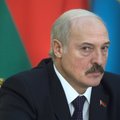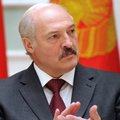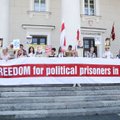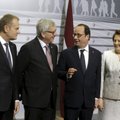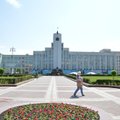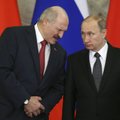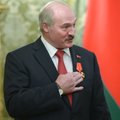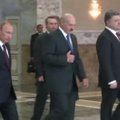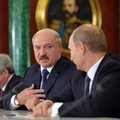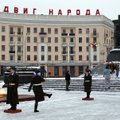Lithuanian Foreign Minister Linas Linkevičius says he is in favour of the European Union lifting sanctions on Belarusian President Alexander Lukashenko.
Alexander Lukashenko
114 straipsnių
Current times in Eastern Europe can hardly be seen as a blessing. With the region more destabilized than ever, not only the economies of Ukraine, the Russian Federation and the surrounding countries suffer, but also the image of Eastern Europe has been in downfall lately. However, for someone these ...
A Russian army base in Belarus would worsen Belarus' relations with Lithuania and would undermine Belarus' goal to normalize its ties with NATO and the European Union, Lithuanian Minister of National Defence Juozas Olekas says.
Russia has announced it is planning to set up a military aviation base in Belarus, while Minsk refrains from comment, even after a meeting between Belarusian President Alexander Lukashenko and Russia's Vladimir Putin.
Several dozen of people gathered in the Town Hall Square in Vilnius on Tuesday urged Belarus to release political prisoners and ensure civil rights in the country.
An action in support of Belarusian political prisoners will take place in the Town Hall Square in central Vilnius on Tuesday.
The European Union launched its Eastern Partnership programme in 2009, soon after Russia's 2008 war on Georgia. It was proposed by Poland and Sweden, with enthusiastic support from Lithuania. Russia has ever since been blaming the programme for trying to undermine its interests in the countries Mosc...
Tatyana Korotkevich, a presidential candidate in the upcoming presidential elections in Belarus this autumn, says she doesn’t expect to become president but just wants to unite Belarusian people who want peaceful changes.
On 8 May, Lithuania is joining Europe in commemorating victory over Nazism. Russia celebrates its own Victory Day on 9 May. The Germans signed the instrument of surrender in Reims, France, on 7 May 1945. It was to come into effect at 11 PM on 8 May.
The Lithuania Tribune / EN.DELFI TV spoke to Dr. Laurynas Jonavičius, Lecturer at the Institute of International Relations and Political Science, Vilnius University. Belarussian president Mr. Lukashenko recently said that it was worrying that USA wasn’t involved directly in Minsk talks. What is Mr. ...
120s: Reserve troops mobilization exercise, Russian ship sinks in 15 minutes, Lukashenko's hints to Putin, Saudi forces hold air raids on targets in Yemen.
120s: Moments before plane crash caught on mobile phone, Unexpected statement from Lukashenko, Bad news for draftees with loans, Eight police cars surrounded a pickup to pull out a woman.
Assassination of opposition leader Boris Nemtsov was a shocking wake-up call for many all over the globe. Circumstances were more than eloquent – bullets hit Nemtsov right in front of Kremlin and merely one day before the planned protest march.
Belarusian President Alexander Lukashenko is interested in the continuity of the Ukrainian war as it helps to disguise his country's internal problems and avoid the West's criticism for non-democratic processes, says Anatoly Lyabedzko, one of the Belarusian opposition leaders.
The Lithuania Tribune / EN.DELFI TV spoke to Linas Kojala, Analyst at the Eastern Europe Studies Centre. Considering current changes in laws and policies of Belarus as well as rhetoric of A. Lukashenko, can we say that Belarus is starting to play “western cards” once again, we asked Kojala.
Lithuania has praised Belarus, saying its position on the Russian-Ukrainian conflict is "very positive" as well as Minsk's decision not to join Moscow's sanctions against EU member states. Lithuanian Deputy Minister of Foreign Affairs Andrius Krivas expressed the position after his visit to Minsk.
Recent developments indicate that two of Moscow's most loyal allies in the former Soviet periphery, Belarus and Armenia, may be reassessing their ties with Russia in light of the country's standoff with the West.
It is tempting to slip into a spiral of sensationalism when describing the concurrent trends in Belarus’s foreign relations and national aspirations, even though—if history is any guide—these trends may be reversed as abruptly as they started. So far, however, tensions have been on the rise along Be...
Russian think tank that pushed for invasion of Ukraine wants Moscow to overthrow Belarus' Lukashenko
Analysts at the Russian Institute for Strategic Research (RISI), a Moscow-based think tank that pushed hard for Russia to invade Ukraine, are now urging Moscow to overthrow Belarusian leader Alexander Lukashenko.
Western sanctions and falling oil prices continue to strain the Russian economy. The impacts of this crisis are being felt across the former Soviet periphery, with neighbouring Belarus experiencing particularly acute spillover effects.
